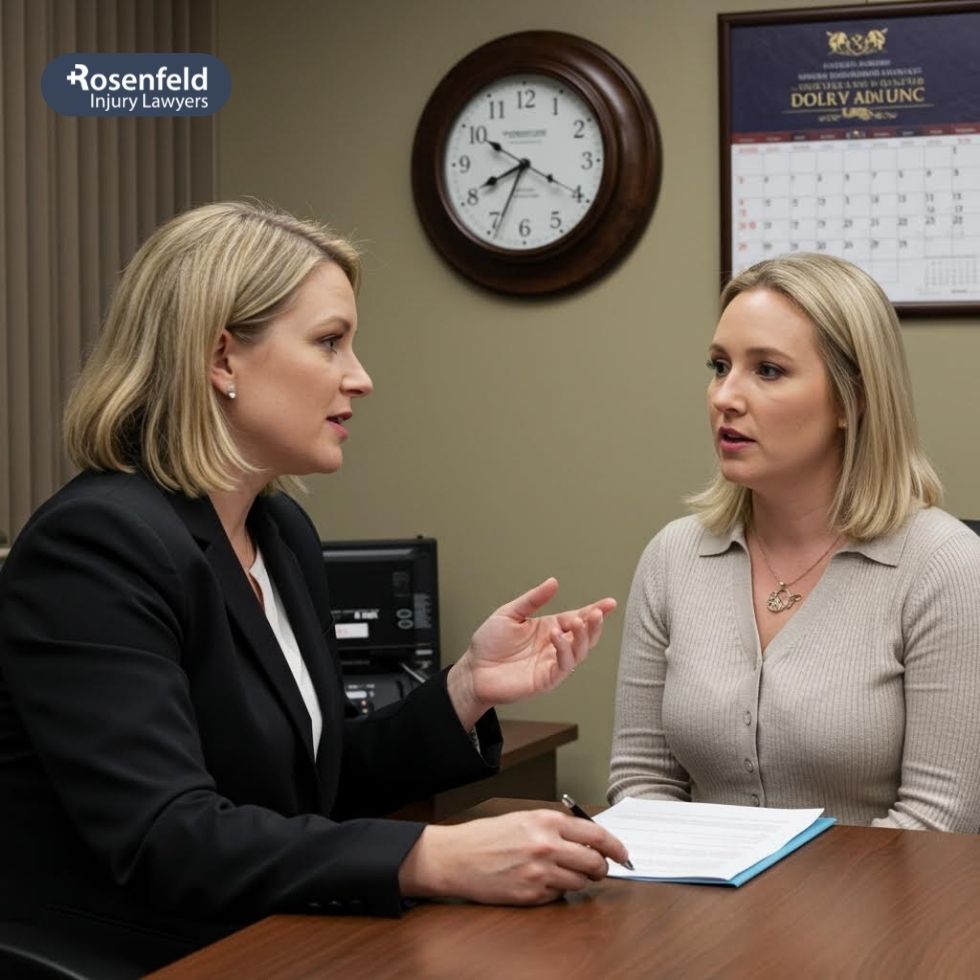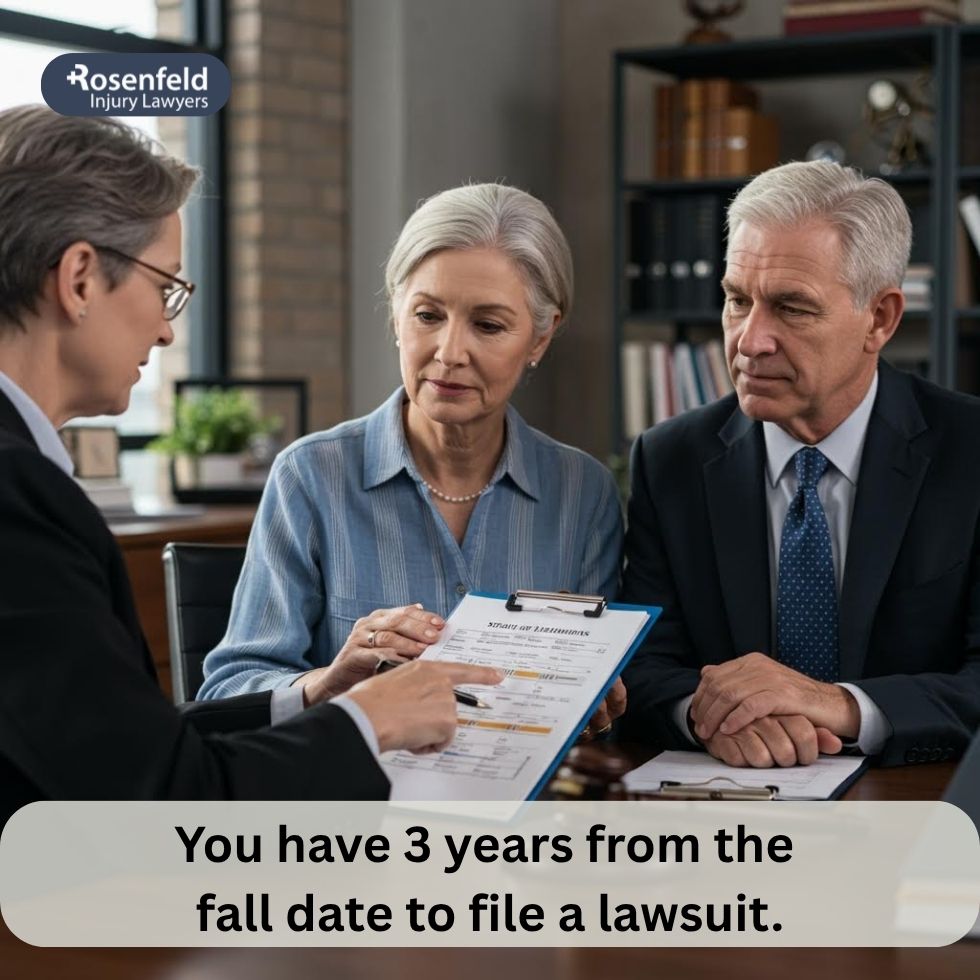Illinois Slip and Fall Statute of Limitations
When you’ve been hurt in a slip and fall accident, the clock starts ticking on your right to take legal action. The Illinois slip and fall statute of limitations sets a firm deadline for filing your case, and missing it can mean losing your chance to pursue compensation, no matter how strong your case is.
At Slip & Fall Injury Lawyers, we help injured people understand these time limits, gather the evidence they need, and make sure their case is filed on time. This guide answers the most common questions about deadlines, proving fault, and navigating the legal process for an Illinois slip and fall.

What Is the Illinois Slip and Fall Statute of Limitations?
Under Illinois law (735 ILCS 5/13-202), you generally have two years from the date of your injury to file a slip and fall lawsuit in civil court. This time limit applies whether your personal injury claim stems from an icy sidewalk, a store spill, or a dangerous stairway. The statute exists to ensure claims are brought while evidence is fresh and medical records are still available.
Failing to meet this deadline almost always results in dismissal. The court will not consider how severe your injuries are or how clear the property owner’s fault might be.
How Does the Statute of Limitations Impact Slip and Fall Claims?
The statute of limitations doesn’t just mark the end of your filing window. It affects every stage of your slip and fall case. Waiting too long can:
- Make it harder to find witnesses or obtain security footage.
- Allow property owners to repair hazards before documentation.
- Risk losing access to complete medical records if providers purge files.
We’ve seen victims spend months negotiating with insurers, only to realize their deadline passed. At Slip & Fall Injury Lawyers, we make sure your claim is protected while we work toward settlement.
Are There Exceptions to the Slip and Fall Statute of Limitations?
A few situations can either extend or shorten the standard two‑year deadline. Understanding these exceptions is important because they can make the difference between a valid case and one the court will not hear.
- Minors: If the injured person was under 18 at the time of the slip and fall accident, the clock doesn’t start ticking right away. Instead, they generally have two years from their 18th birthday to file.
- Discovery rule: In rare cases, someone might not realize the full extent of their injuries until later—for example, if symptoms develop gradually. In those situations, the filing period may begin when the injury is discovered, rather than on the accident date.
- Government claims: If your accident happened on property owned or maintained by a government entity—such as a public sidewalk, city‑run building, or a Chicago Transit Authority station—the rules are stricter. Under 745 ILCS 10/, the Local Governmental and Governmental Employees Tort Immunity Act, you may have only one year to act, and you must give written notice in a specific way before filing a personal injury lawsuit.
How Do You Determine Fault for a Slip and Fall Accident?
Proving fault in a slip and fall case isn’t just about showing you got hurt, but connecting your injuries directly to a property owner’s negligence. Under the statute of limitations rules, you only have a limited window to build that proof, so acting quickly is key.
In Illinois, you must establish the four elements of premises liability:
- A dangerous condition existed — something on the property created an unreasonable risk of harm, such as ice on a sidewalk, a broken step, or spilled liquid on a store floor.
- The premises knew — the owner, manager, or another responsible party either knew or should have known about the hazard.
- Failure to address it — they didn’t take reasonable steps to fix it or warn visitors in time.
- Causation — the unsafe condition directly led to your fall and resulting injuries.
Proving these points often requires a mix of evidence: maintenance logs, surveillance footage, eyewitness statements, weather reports, and your medical records. This is where a skilled law firm can make all the difference. We know how to preserve fragile evidence before it’s lost and present it in a way that shows clearly who should be held liable for your slip and fall lawsuit.
What Types of Slip and Fall Injuries Qualify for Compensation?
Some of the most common injuries we see in premises liability claims include:
- Fractures — broken hips, wrists, ankles, or shoulders are especially common when people land hard on tile, concrete, or ice.
- Head injuries — concussions or traumatic brain injuries can occur even from a short fall, especially if you strike a hard surface.
- Spinal damage — a herniated disc or spinal cord injury can cause chronic pain, weakness, or paralysis.
- Soft tissue injuries — torn ligaments, muscle strains, and severe sprains often require physical therapy and weeks of recovery.
Even injuries that seem minor at first can develop into chronic issues. That’s why your medical records are so important—they document the full scope of your harm from day one, which strengthens your position in any slip and fall lawsuit.
What Damages Can You Recover in a Slip and Fall Lawsuit?
In Illinois, damages can include both economic losses and non‑economic harm.
Economic damages are the measurable financial losses you’ve faced, such as:
- Medical bills for emergency care, hospital stays, surgery, and follow‑up appointments
- Physical therapy and rehabilitation to restore strength and mobility
- Lost wages from time missed at work, and loss of future earning capacity if your injury affects your career
- Costs of in‑home care or necessary modifications, such as ramps or handrails
Non‑economic damages cover the personal impact of the accident:
- Pain and suffering from the injury and recovery process
- Emotional distress, such as anxiety or depression
- Loss of enjoyment of life if you can no longer take part in activities you once enjoyed
In some cases, if the owner’s conduct was especially reckless, punitive damages may be available. These aren’t meant to reimburse you, but to punish wrongdoing and deter similar behavior in the future.
What Mistakes Cause People to Miss the Statute of Limitations?
Some of the most common mistakes that cause people to lose their rights include:
- Waiting too long to act — focusing on recovery from injuries without contacting a slip and fall lawyer until it’s too late.
- Believing an insurance adjuster — some insurers make it seem like they’ll “work with you” indefinitely, but they have no obligation to pause the deadline.
- Delaying for complete bills — waiting until all medical expenses are tallied before starting the claim can cost you valuable time.
- Not realizing the property was government‑owned — claims against government property operators often have much shorter deadlines and special notice requirements.
The statute is unforgiving. Even if you’re only a few days late, the court will likely throw out your slip and fall lawsuit. The safest move is to involve Slip & Fall Injury Lawyers right away so the deadline is tracked, evidence is preserved, and your case is filed on time.
How Do Insurance Companies Fight Slip and Fall Claims?
Insurance companies in slip and fall claim negotiations often try to avoid paying full value. They might argue:
- The hazard was “open and obvious”
- You were an invited guest who should have seen and avoided it
- Your injuries came from a different cause
They also dig through medical records looking for pre‑existing conditions to blame. At Slip & Fall Injury Lawyers, we counter these tactics with surveillance footage, witness accounts, expert analysis, and thorough documentation of your injuries.
How Can a Law Firm Help You Win Your Slip and Fall Case?
When you hire Slip & Fall Injury Lawyers, we take on every part of your slip and fall case so you can focus on healing. From the moment you call us, we start building your slip and fall claim with the evidence needed to meet the legal standards under the statute of limitations in Illinois.
Here’s how we help:
- Investigating the accident — we visit the scene, take photos, and gather proof that the property wasn’t maintained with reasonable care.
- Securing medical documentation — we work directly with your doctors to make sure your medical records clearly link your injuries to the accident.
- Determining fault — we identify all various parties who may be held liable, from the property owner to contractors or government property operators.
- Negotiating with insurers — we push back when they try to undervalue your slip and fall lawsuit or blame you for the accident.
- Preparing for trial — if the insurance company won’t offer fair compensation, we’re ready to present your case in court before the deadline expires.
Our goal is simple: to help you seek compensation for your medical costs, lost income, and the pain and disruption this accident has caused in your life. And because we work on a contingency fee basis, you won’t owe us anything unless we win.

Book a Free Consultation
If you’ve been hurt in a slip and fall accident anywhere in Illinois, don’t wait until the statute of limitations is about to expire. Contact Slip & Fall Injury Lawyers today to discuss your slip and fall claim with a team that knows how to win.
Your consultation is completely free, and we’ll review your case, explain your rights, and outline the steps to protect your slip and fall lawsuit. We work on contingency, so you pay nothing unless we recover compensation for your injuries. Call us now or use our online form to get started.
Content reviewed by Chicago slip and fall accident lawyer Jonathan Rosenfeld of Rosenfeld Injury Lawyers LLC, who holds property owners and management companies accountable to obtain justice for injured visitors and tenants, and is a trial lawyer recognized by Super Lawyers, Lawyer Legion, and Distinguished Justice Advocates for premises liability litigation.







